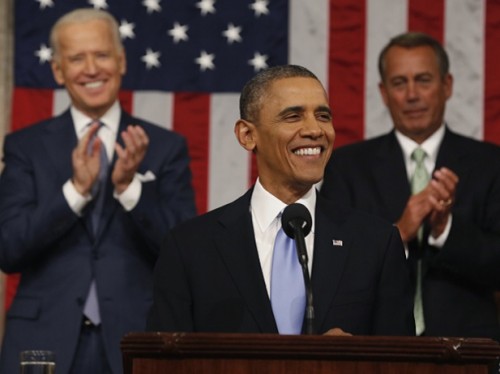President Barack Obama will announce a variety of new initiatives Tuesday night in his seventh State of the Union speech. But how successful will he be in getting Congress to approve them?
Even before he climbs to the podium, history suggests that he won’t accomplish many of his legislative proposals. The longer presidents are in office, the tougher it usually is for them to get lawmakers to adopt their agendas, according to research by political scientists Alison Howard of Dominican University and Donna Hoffman at the University of Northern Iowa.
Every president since Lyndon Johnson, with the exception of Bill Clinton, has seen his State of the Union legislative success rate fall since his first year in office.
(Clinton’s most successful year was actually his fourth year in office, 1996 when Congress partially or fully approved 64 percent of his requests that year.)
Despite an often combative relationship between Obama and Congress, the president’s State of the Union legislative proposal success rate in his first term was slightly higher than the average of all presidents since Johnson, according to Howard and Hoffman’s research.
“President Obama has been successful with his legislative requests,” said Howard, chair of Dominican’s Department of Political Science and International Studies. “His full and partial request success rate was about 45 percent during the first term, which is practically identical to Ronald Reagan’s full terms in office and slightly above the median yearly rate of 43 percent.”
Among his legislative successes in his first term was Congressional approval of a $787 economic stimulus package, financial industry reform and the elimination of some of the Bush-era tax cuts on the wealthy. But he failed to get Congress to act on some of his other major proposals, including immigration reform, a broad energy policy, comprehensive tax reform and a boost in the minimum wage for all workers.
Obama’s success rate in getting State of the Union proposals enacted by Congress has plummeted in his second term. Just 4.9 percent of his 41 proposals requiring Congressional approval were either partially or fully enacted in 2013. That was the lowest rate of any year for any president going back to Johnson.
His closest competitor for that dubious record was Ronald Reagan, who saw only 5.3 percent of his 19 proposals adopted partially or fully by Congress in 1987, Reagan’s second-to-last year in office.
Clinton, a policy wonk’s policy wonk, proposed more new programs than any president since Johnson, 455 during his eight years. That included a record 87 in 2000, his last year in office. Congress partially or fully approved 31 percent of them.
By contrast, Obama’s success rate improved last year to 17.9 percent. But the president will face an especially tough time this year getting Congress to go along with his proposals because Republicans have taken control of the House and Senate for the first time since Democrat Obama was elected in 2008.
Obama has already gone on the offensive, already having revealed many of this year’s State of the Union proposals to Americans during trips around the country.
“Why wait for the State of the Union?” Mr. Obama asked a receptive audience at Central High School in Phoenix, on Jan. 8, when he rolled out a plan for making housing more affordable. “It’s sort of like you’ve got presents under the tree, you kind of start shaking them a little bit. I want to kind of give you a little sense of what I want to talk about.”
Among those proposals are free community college for many students, a requirement that workers get up to a week of paid sick leave and a boost in the earned income tax credit for low-income working families.
But Obama’s most controversial proposal is likely to be a plan that would raise taxes on the wealthy by $320 billion over the next decade. That money would be used to cut taxes on the middle class and would pay for his free community college plan.
The plan, announced by the White House on Saturday, already faces stiff opposition by Republicans in control of Congress.
“Slapping American small businesses, savers and investors with more tax hikes only negates the benefits of the tax policies that have been successful in helping to expand the economy, promote savings and create jobs,” said Senator Orrin G. Hatch, Republican of Utah and chairman of the Finance Committee. “The president needs to stop listening to his liberal allies who want to raise taxes at all costs and start working with Congress to fix our broken tax code.”
Now again in the spotlight because of the Oscar-nominated movie Selma, Johnson had the most success of any president during the past 50 years in getting Congress to approve his initiatives. These included the Great Society domestic programs and the Voting Rights Act.
But Johnson had the benefit of Congress being controlled by his Democratic Party during his four years in office. Obama, history suggests, faces an uphill battle with Republicans in control in both houses.











